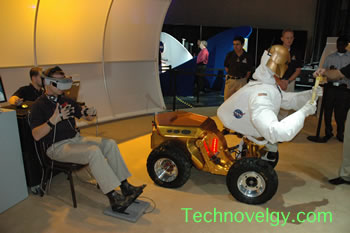Science Fiction
Dictionary
A B C D E F G H I J K L M N O P Q R S T U V W X Y Z
GITAI R1 Lunar Rover Like NASA Robonaut Centaur

GITAI has developed what it describes as an advanced lunar robot rover called "R1" that can perform a variety of tasks in the harsh environment of the moon.
In December of 2021 at the mock lunar surface environment in JAXA’s Sagamihara Campus, the GITAI lunar robotic rover R1 conducted numerous tasks and mobility operations, successfully completing all planned tests. Here we release a digest video of the demonstration.All of the key components of our robots were developed in-house by our team of robotics experts. This includes the motors, motor drivers, autonomous control system, and teleoperation system. By designing and building these components ourselves, we are able to ensure the highest levels of quality and performance, as well as greater control over the design and development process.
The seamless integration of hardware and software within the Lunar Rover allows for maximum performance, enabling it to handle the harsh lunar environment. Its high-power actuation system is designed for high-speed and high-torque motions, providing an elastic response to external forces. Its dual-arm manipulation system is capable of performing intricate tasks and significantly expanding its range of applications.
(Via GITAI)
As far as I can tell, it is a teleoperated robot with some autonomous features.
Almost twenty years ago, I saw NASA's Robonaut Centaur robot demonstrated at NextFest 2006 in New York city (see Robonaut Centaur At NextFest 2006).

(Robonaut Centaur and driver)
The insight that allows a complex robot like Robonaut to be controlled by natural human movement was achieved by science fiction writer Robert Heinlein. In his 1942 short story Waldo he described a way that a remote gripping arm could be controlled by an operator.
Scroll down for more stories in the same category. (Story submitted 8/27/2024)
Follow this kind of news @Technovelgy.| Email | RSS | Blog It | Stumble | del.icio.us | Digg | Reddit |
Would
you like to contribute a story tip?
It's easy:
Get the URL of the story, and the related sf author, and add
it here.
Comment/Join discussion ( 0 )
Related News Stories - (" Robotics ")
Atlas Robot Makes Uncomfortable Movements
'Not like me. A T-1000, advanced prototype. A mimetic poly-alloy. Liquid metal.' - James Cameron, 1991.
Humanoid Robots Tickle The Ivories
'The massive feet working the pedals, arms and hands flashing and glinting...' - Herbert Goldstone, 1953.
Golf Ball Test Robot Wears Them Out
"The robot solemnly hit a ball against the wall, picked it up and teed it, hit it again, over and again...' - Frederik Poh, 1954.
PaXini Supersensitive Robot Fingers
'My fingers are not that sensitive...' - Ray Cummings, 1931.
Technovelgy (that's tech-novel-gee!) is devoted to the creative science inventions and ideas of sf authors. Look for the Invention Category that interests you, the Glossary, the Invention Timeline, or see what's New.
Science Fiction
Timeline
1600-1899
1900-1939
1940's 1950's
1960's 1970's
1980's 1990's
2000's 2010's
Current News
The New Habitable Zones Include Asimov's Ribbon Worlds
'...there's a narrow belt where the climate is moderate.'
Can One Robot Do Many Tasks?
'... with the Master-operator all you have to do is push one! A remarkable achievement!'
Atlas Robot Makes Uncomfortable Movements
'Not like me. A T-1000, advanced prototype. A mimetic poly-alloy. Liquid metal.'
Boring Company Drills Asimov's Single Vehicle Tunnels
'It was riddled with holes that were the mouths of tunnels.'
Humanoid Robots Tickle The Ivories
'The massive feet working the pedals, arms and hands flashing and glinting...'
A Remarkable Coincidence
'There is a philosophical problem of some difficulty here...'
Cortex 1 - Today A Warehouse, Tomorrow A Calculator Planet
'There were cubic miles of it, and it glistened like a silvery Christmas tree...'
Perching Ambush Drones
'On the chest of drawers something was perched.'
Leader-Follower Autonomous Vehicle Technology
'Jason had been guiding the caravan of cars as usual...'
Golf Ball Test Robot Wears Them Out
"The robot solemnly hit a ball against the wall, picked it up and teed it, hit it again, over and again...'
Boring Company Vegas Loop Like Asimov Said
'There was a wall ahead... It was riddled with holes that were the mouths of tunnels.'
Rigid Metallic Clothing From Science Fiction To You
'...support the interior human structure against Jupiter’s pull.'
Is The Seattle Ultrasonics C-200 A Heinlein Vibroblade?
'It ain't a vibroblade. It's steel. Messy.'
Roborock Saros Z70 Is A Robot Vacuum With An Arm
'Anything larger than a BB shot it picked up and placed in a tray...'
A Beautiful Visualization Of Compact Food
'The German chemists have discovered how to supply the needed elements in compact, undiluted form...'
Bone-Building Drug Evenity Approved
'Compounds devised by the biochemists for the rapid building of bone...'
